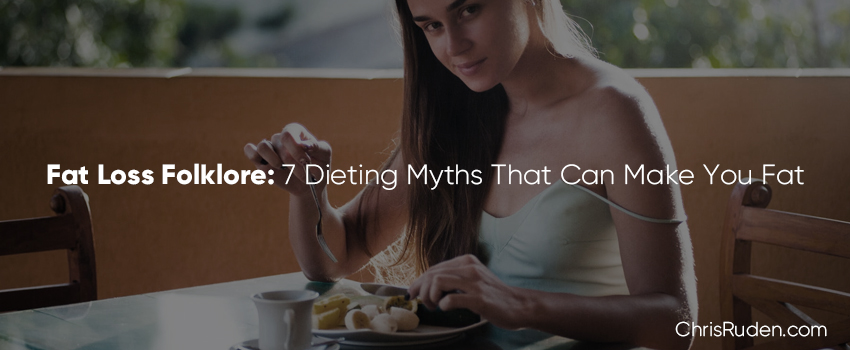Fat Loss Folklore: 7 Dieting Myths That Can Make You Fat
What if I told you that all of your dieting techniques are making you fatter? I hate to be the bearer of bad news but most dieting tricks are full of poo and don’t actually help you lose weight. In fact, some dieting myths have the reverse effect— weight gain.
The only thing worse than dieting is dieting…and not seeing results. I hate wasted time almost as much as I hate ignorantly perpetuated myths that spread like disease among people who go on a diet. The amount of “fat loss folklore” out there is incredible given the information availability machines we are glued to 24/7.
Let’s dispel some of these dieting myths and see if you are guilty of believing any of them.
1. Eating At Night


I’m not even sure how this started but the concept is just ridiculous. The story goes something like this “ if you eat after X:00pm, your body will store the food as fat while you sleep.”
So If Im in Florida EST and I cant eat after 8:00pm, I can get an extra 3 hours of eating if I fly to California? And since the body clearly shuts of while you sleep (which is why you stop breathing and pumping blood…right?) it breaks the good down and stores it as fat? What?
Multiple studies show there is little to no significance with meal timing or eating at night. Imagine people who work 12 hour shifts who cant eat while on shift. They are going to get enormously fat because the time of day? It just doesn’t make sense.
This mentality can cause people to under eat and over time may lead to a slower metabolism and fat gain indirectly. While you may not need an excess of calories before you go to sleep, eating at night certainly doesn’t not cause you to gain weight.
By now, you should know from my other article series Why We Are Getting Fat that fat gain is caused by overconsumption of calories, imbalanced macronutrients, crappy food additives, and lack of exercise… not time eating. I go over this and teach you how to lose fat the right way in my ebook “The Art of Losing Body Fat” if you aren’t familiar with how fat loss really occurs!
So continue with your Netflix & chill sessions— as long as you aren’t exceeding your calorie/macronutrient goals for the day.
2. Skipping Breakfast


Have you ever skipped breakfast and felt almost guilty? Why wouldn’t you? We were told our entire lives that you can’t skip breakfast for one reason or another.
But it seems Tony the Tiger and the Trix Rabbit might be misleading us.
It is an old diet wives tale that skipping breakfast, the most important meal of the day, will cause your metabolism to crash and burn, leaving you obese and metabolically inept to lose weight.
Most research showing breakfast to be extremely important is funded by cereal companies.
As nutrition researcher Marion Nestle puts it: “Many — if not most — studies demonstrating that breakfast eaters are healthier and manage weight better than non-breakfast eaters were sponsored by Kellogg or other breakfast cereal companies whose businesses depend on people believing that breakfast means ready-to-eat cereal.”
The largest such trial to date followed 300 people who were trying to slim down for 16 weeks. The researchers found that eating breakfast had no effect on weight loss during this period. (Another, older randomized trial found people lost more weight when they skipped breakfast.)
I don’t think you should necessarily skip breakfast but I do think the added calories/sugar from major breakfast food companies play a role in gaining weight for sure.
3. Eat Every Two Hours


“Eating big meals causes weight gain so it’s better to stoke the metabolic fire by eating small meals every two hours.”
You know, to stoke the metabolic fire, prevent muscle catabolism, keep blood sugar levels. Sound familiar? That’s because every recently-online-certified personal trainer has made it their mission to implant this thought in peoples heads.
But eating like this can cause you to want more food and have an unstoppable appetite…not to mention create some food-obsessed dieters that tend to gain more weight than they lose.
When you accustom your body to eating frequently, your body craves food regularly. Satiety will be short lived as your body desires more food often. There’s no metabolic advantage to eating frequently. Whether you have 3 meals or 14 meals, your metabolism does not alter significantly.
If you think you are going to lose all your muscle mass and waste away if you don’t always have a dry chicken breast hanging out of your mouth— fret not. You will not enter a muscle-wasting catabolic state unless you are starving yourself for days and do not hit the gym. To induce “starvation mode” via meal frequency you’d need to avoid food altogether for more than 60 hours. (study)
4. Diet Food


Have you ever gone to buy food and noticed the same item but one said low fat or low sugar so you bought it. Diet foods make you feel good about buying them and eating them, well, because they are diet, right?
All too often, foods that are labelled as ‘healthy’ are the exact opposite. They might say ‘low-fat’ but be laden with sugar. They might say ‘gluten free’ but have a lot of calories. Yet, people flock to food that is low fat or low sugar with no regard for the caloric content.
Research even tells us that when consumers become aware that a particular food is ‘lower in fat’ they take this as a sign to eat even more of it. In fact, research suggests that consumers eat up to 30% more of the ‘lower in fat’ product than they normally would if it was not marketed to them as a ‘lower in fat’ product.
Overconsumption of calories leads to weight gain and often happens in the presence of diet foods as people have a false sense of security with these magically fat repelling foods.
A proper way to lose weight is to control portions…not just eliminate all tasty foods. Long term adherence is key, not gobbling down every low fat nutrigrain bar you see.
5. Switching From Soda To Sports Drinks


Liquid obesity is a real thing. It’s amazing how easy it is to get 1000 calories in from Starbucks alone. Liquid calories hide so well in delicious beverages, especially soda.
One of the quickest diet shifts people make is dropping the fizzy stuff and replacing it with gatorade or juice. It’s called a sports drink and is seemingly healthy because it’s juice but beware— they often have just as many calories as soda.
6. No Carbs


Carbs have been demonized for causing weight gain but that just isn’t true. As I covered in my post “Why we get fat”, overconsumption of calories leads to weight gain.
People tend to cut carbs on diets which is not a problem… unless of course you do what most people do and complete;y disregard your daily calorie and macronutrient amounts and just focus on not eating any carbs.
Weight loss is science not magic. Why does cutting carbs out completely not work? Well you need some carbs for energy metabolism (it is actually the preferred energy source). If you cut carbs completely, you might be in too big of a calorie deficit and begin losing muscle mass and slowing your metabolism, leading to weight GAIN, or at the minimum, halting weight loss.
There is always a water weight loss period associated with decreased carbs which causes people to marry the concept that all carbs are bad. This often leads to temporary weight loss with little body composition change, long plateaus, and completely unaccounted nutrition intake leading people nowhere fast.
Focusing on a balance of protein, carbs, and fat is a much better alternative than being an extremist and cutting carbs. To figure out how much food you need to eat, go here!
7. Salads Only


Salad has become the joke of dieting. The word diet almost means salad in today’s age of dieting. and I’m not really sure why.
Along with cutting carbs, salad for every meal is a notorious go-to for dieters, thinking eating less of everything will give them the results they want.
It won’t.
Weight loss is more than eating less. It’s eating enough of what you need based on your goals and current stats. A person who weighs 200lbs with a body fat percentage of 30 needs a different diet composition than a person weighing 200lbs with a body fat percentage of 10.
There is no universal fix to an individual problem. And if there was, it wouldn’t be salad.
Viewing salad as a main dieting tool will often lead to grossly underrating, not enough protein, and stalled fat loss (if not fat gain in attempt to protect the body from being malnourished). Salad is not bad— it just isn’t the only thing you should be eating to lose weight.
Conclusion on Dieting Myths
Avoid falling for the fat loss myths that can hinder progress and cause unwanted fat gain. I’m not sure that these myths will ever die, even with the body of evidence that refutes them but all I can do is arm you with the truth! Feel free to message me and set up a free Skype call to talk about accomplishing your goals in and out of the gym!

